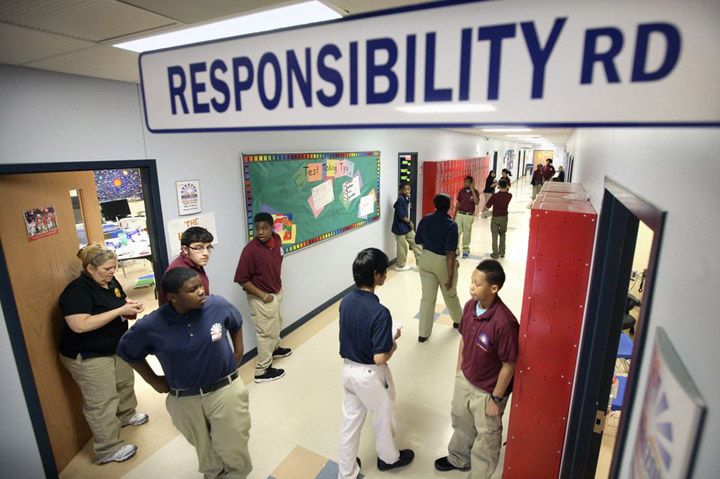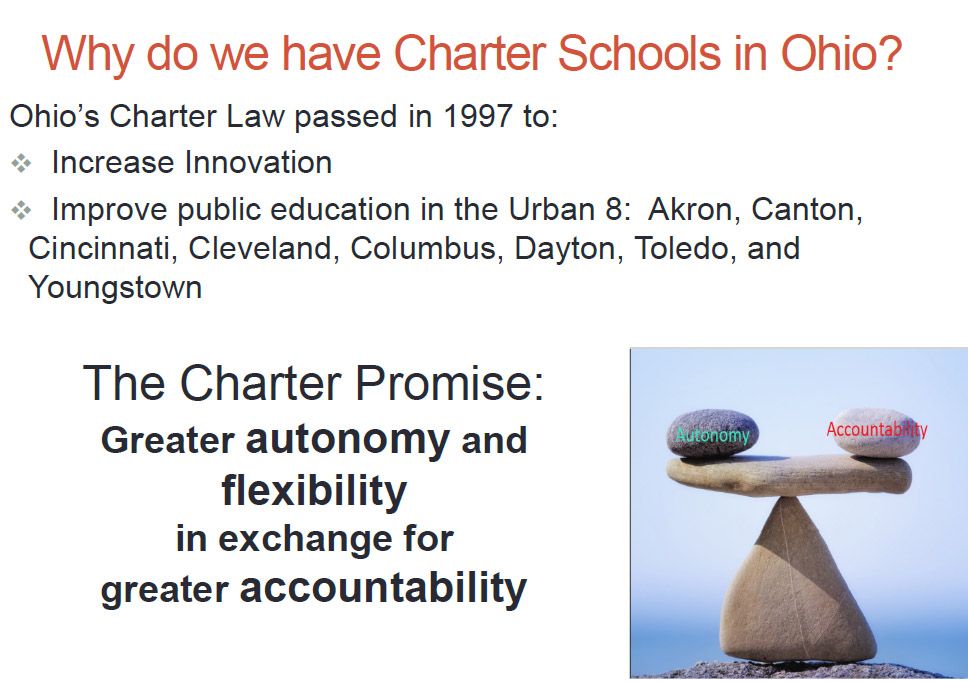Yesterday’s Cincinnati Enquirer featured an article on an FBI raid on one of our local schools that is part of a 19 school investigation.
Horizon Science Academy Cincinnati and its management company Concept Schools, Inc. is being investigated for improper relations with technology vendors.
According to the Enquirer:
The court-ordered search warrant and a log of evidence seized in the June 4 raid in Bond Hill focus on the federal E-rate program or the installation or upgrades of computer networks. The $2.3 billion federal E-rate program, administered by the Federal Communications Commission, provides discounts to help schools and libraries obtain affordable telecommunications and Internet access.
This search comes on top of
testimony from four former teachers at Horizon Science Academy in Dayton about sex games, unqualified teachers, test tampering, and potentially criminal misdeeds at the charter school.

This might make you angry at what could be seen (and is often portrayed) as an isolated incident.
The Enquirer article leaves out quite a bit of context, however. Most relevant to the story is the public and educational oversight from which Ohio charter schools are exempt.
Both public and private schools in Ohio are overseen by the Ohio Board of Education (BOE). However, two completely different sets of rules apply. Charter schools receive exemptions from a broad range of educational requirements.
Ohio's Plunderbund first brought this to light in some of the best reporting in the state on charter school exemptions. I will highlight a few and encourage reading the full article.
Ohio revised code exempts charter schools from over 150 public school regulations:
3314.04 Exemption from state laws and rules. Except as otherwise specified in this chapter and in the contract between a community school and a sponsor, such school is exempt from all state laws and rules pertaining to schools, school districts, and boards of education, except those laws and rules that grant certain rights to parents.
The exemption for charter schools includes State Board of Education minimum requirements for:
- Assignment of professional personnel according to training and qualifications
- Instructional materials and equipment, including library facilities
- Proper organization, administration, and supervision of schools; buildings and grounds
- Admission and promotion of students
- Reporting requirements

The list of exemptions is eye-opening:
- Training requirements for school treasurers and business managers
- Preschool program standards and licensing (other than parental access rights)
- Requirement to maintain grades K-12
- Requirement to pay full-time employees while on jury duty
- Standards for minimum school year and minimum school day
- Vocational education requirement
- Requirements related to the publishing of school materials for the public
- Requirement to comply with all school law and State Board rules in order to participate in the state basic aid funding program
- Requirement to annually report licensed employees to the State Board
- Teacher employment and contract requirements (however, if a community school receives federal Race to the Top money, it must adopt a “standards-based” policy for annual teacher evaluations)
- Requirements regarding statistical reporting to the State Board
- Penalties and consequences for failure to submit reports to the State Board
- Competitive Bidding Law regarding school bus purchases
The full list prepared by the non-partisan Legislative Services Commission is located here.
Why two sets of educational requirements? Shouldn't educational requirements be the same regardless of whether a school is run as a for-profit business or public entity?
I even questioned whether charter schools were subject to any curriculum requirements. At least Ohio Core curriculum requirements are still required. Statewide standardized tests are also still required.
In a nutshell, here's how we're being sold that charter schools work: Specify the curriculum, test, and let the “market” determine everything else. Schools will regulate themselves.
The problem with this thinking is quite simple. If you turn schools into profit centers where the only performance requirement is scores on a test, the incentive is to produce scores in the cheapest way possible.
The cheapest way possible is to provide the cheapest education possible while figuring out how to achieve high test scores. In some cases this is tampering with the scores, in other cases its simply getting rid of potentially low-scoring students.
While charter schools sound shiny and new and "innovative," if you don't structure incentives well, markets will perform poorly. Incentives should not only reward performance but penalize those who cheat and game the system.
Unfortunately, the Ohio Department of Education cannot close a charter school as it could a failing public school. The DOE can only pressure a charter school's sponsor to oversee changes to a school and, if the sponsor doesn't comply, request a new sponsor.
The problem is that Ohio allows too many authorizers. In 2012-13, according to the National Association of Charter School Authorizers (NACSA), Ohio had 69 separate agencies authorizing schools. Many states allow authorization only at the state or local school district level.
With so many sponsors, if a school loses a sponsor it’s easy to find another.
Value Learning and Teaching (VLT) Academy, a poor performing charter school in Cincinnati, went shopping for sponsors this year when Educational Resource Consultants of Ohio (ERCO) declined to renew its sponsorship of the school.
It is so bad in Ohio that even charter school thought leaders like the National Association of Charter School Authorizers (NACSA) said “Ohio is more broken than the Wild West.”
And standards for sponsors? Well, Ohio finally adopted some. Again, however, the problem is that the state has to be willing to go after a sponsor for not following standards.
At the heart of this problem is the same problem our nation faced with the financial collapse, the same problem we faced with our health care system. We see it over and over.
Markets, especially unregulated markets with little to no oversight and no responsibility to the people, frequently don't work.
People and families have fought for years to raise the bar for public schools and to make sure educators, qualified professionals, are in charge and that incentives are in place to educate children.
Within the span of two decades all of this work is being wiped out in favor of a system in which the primary incentive is profit.
In 2013, Ohio spent $900 million on privatized schools. State representatives such as Andrew Brenner are calling for the privatization of all Ohio schools.
There’s an almost religious belief that markets (in this case, for schools) somehow produce amazing, some would say unbelievable, results when simply left alone. The reality, however, is that market agents respond to incentives. If incentives are structured incorrectly and there is little oversight (not even a way to close down failing charters), we shouldn’t be surprised when schools take the money and fail our kids, again, and again, and again, and again.
The media often portrays the problem as isolated incidents. According to the Columbus Dispatch however:
Almost 84,000 Ohio students — 87 percent of the state’s charter-school students — attend a charter ranking D or F in meeting state performance standards.
The issue goes beyond politics. Republican politicians have long embraced charter schools because of their belief in markets. You would think Democrats might be different. However, they seem to have jumped aboard the charter school train as well with prominent Democrats like Rahm Emanuel in Chicago and Michael Nutter in Philadelphia pushing privatization. At the national level, Barack Obama
proclaimed charter schools “incubators of innovation” during National Charter Schools Week.
I believe, however, that politicians are talking about charter schools because charter school companies donate to their campaigns. On both sides.
With public schools, the incentive is education. Public schools are accountable to the people and are free from having to turn a profit. Public schools have oversight and guidelines designed by educators. And public schools cannot donate to politicians.
While public schools have their own issues, I question whether replacing them with profit center schools is the answer.
Regardless though of the type of school, at what point do we start talking about students again and stop talking about “markets”? At what point do we put kids and learning above profit?
We're certainly not there yet. Ohio's Department of Education's first action was to protect the charter schools and report the four teacher whistleblowers to law enforcement and child services agencies.

---

David Akadjian is the author of The Little Book of Revolution: A Distributive Strategy for Democracy.


